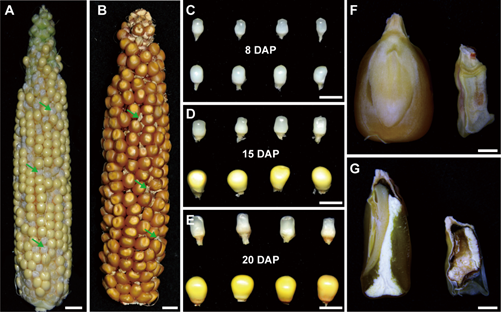The scientists of the Crop Metabolic Regulation and BiofortificationInnovation Team inBiotechnology Research Institutehave identified a defectivekernel mutant (Figure 1) and cloned its causalgene, encoding a P-type pentatricopeptide repeat (PPR)protein.This study firstlydiscovered the new function ofP-type PPRto maintains the integrity of the 5´-UTR region of important gene (ccmFN)inmitochondria,and the gene was named cytochrome c maturation FN stabilizer1 (CNS1). Relevant results were published in Plant Physiology.

Figure 1. Phenotypes of the cns1 mutant
Mitochondria, as a semi-autonomous organelle, provide energy for many life activities, which depend on the coordination between mitochondria and nuclear-encoded proteins to maintain the structure and function of the electron transport chain. Dysfunction of mitochondria could lead to a variety of animal and plant diseases, such as Alzheimer's disease and abnormal leaf morphology in plants. As a class of RNA-binding proteins widely distributed in land plants, PPR proteins mainly perform RNA post-transcriptional modification functions in mitochondria or chloroplasts. In addition, P-type PPR proteins are mainly involved in the functions of RNA splicingand RNA stability. It has been reported that the P-type PPR protein can play RNA stability function at both 5´ and 3´ ends of chloroplast encoding genes and has also been reported to play a role in the stability of the 3´ end of mitochondrial genes. However, it is still unknown whether PPR proteinsfunction in RNA stabilization function at the 5´-terminusof mitochondrial transcripts.
In this research, the cns1 mutantkernels are small and wrinkled. Thecorrectness of genecloning was confirmed by allele test and gene overexpression complementation experiments. Further functional analysis showed that CNS1localizes to the mitochondrion, and its mutation affects the assembly and function of mitochondrial complexIII exclusively. 5´ and3´-termini of complexIII-related genes, encoded by mitochondria, were examinedby cRT-PCR. Interestingly,the 5´ end of ccmFN was severely truncated in the cns1 mutant comparedto the wild type. Moreover,the result of EMSA and MST assays jointly proved that CNS1 can directly bind to the 317 bp upstream of AUG of the ccmFN transcript, thereby protecting the integrity of its 5´-terminal sequence. These findings reveal the mechanism by which PPR proteins protect the 5´-end of the mitochondrial transcript, and provide a new theoretical basis for an in-depth understanding of the maturation process of mitochondrial-encoding genes.
Ma Shuai, a Ph.D. student of the Biotechnology Research Institute, is the first author of the paper.Zhou Xiaojin(associate professor) and Chen Rumei(professor) of Biotechnology Research Institute are the co-corresponding authors. This paper was supported by theNational Key Research and Development Program of China, the National Special Program for GMO Development of China, and the National Natural Science Foundation of China. |